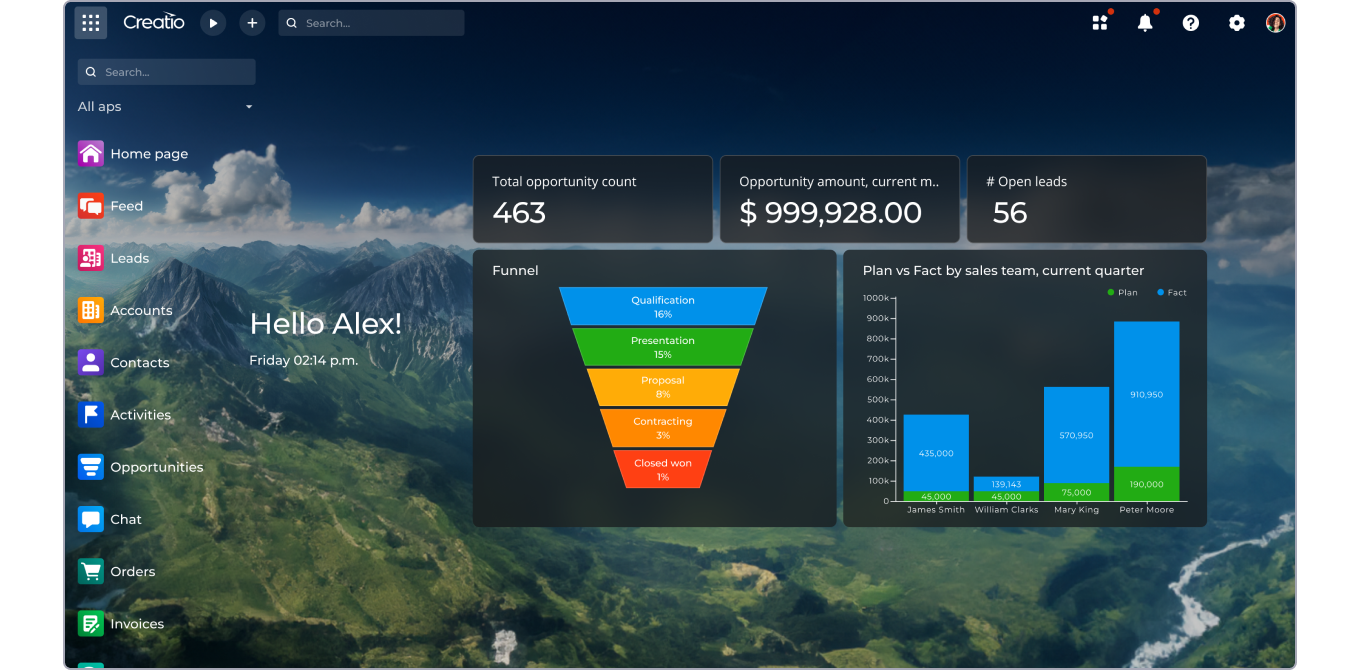What is Sales Automation? Simple Guide
Navigating complex sales environments poses considerable challenges; it requires continual meetings, discussions, and careful task management. The demand for effective multitasking amplifies in industries with high lead volumes and parallel sales processes. Yet, how can one alleviate persistent pressure? The solution lies in specialized software systems tailored to meet the requirements of sellers.
Sales automation technology streamlines your activities and increases close rates. According to LinkedIn's State of Sales Report 2022, 80% of sellers who met or surpassed 150% of quota use sales tech at least once a week.
This article explores the significance of sales automation and shows how customized software may reduce sellers' workloads, boost productivity, and act as a catalyst for increased organizational profits.
What is Sales Automation?
Sales automation is a process that involves using specialized software to simplify the workload of your sales team. From lead generation to the final stages of closing a sale, sales automation enhances the efficiency of the entire sales journey. Additionally, sales managers may identify areas for improvement and obtain a deeper comprehension of their team's performance with the help of sales automation.
It is important to understand that sales automation does not replace sales reps but rather complements their efforts. By handling routine tasks, automation enables sellers to redirect their focus towards crucial activities like lead qualification, refining the sales process, and offering personalized attention to high-potential prospects.
In the competitive sales landscape, the integration of sales automation tools is essential for any organization striving to maintain a competitive edge.
What Are the Benefits of Sales Automation?
Sales automation provides transformative benefits, improving efficiency and effectiveness throughout the sales process. These advantages, spanning from streamlining processes to providing insightful data, empower sales teams to increase productivity and enhance income.
Improved sales productivity
Sales automation enhances productivity by allowing teams to concentrate on high-value tasks. Instead of spending time on tedious activities, such as data entry, sales reps can prioritize high-quality leads and strategic deals. Additionally, through in-depth analysis of salesperson performance and sales dynamics, automation provides valuable insights. This allows for informed decision-making, enabling sales teams to optimize their strategies and further enhance overall productivity.
Enhanced lead generation
Rather than dispersing resources throughout every customer interaction, automation assists in identifying the people who are most likely to become customers. This strategic focus ensures that resources are efficiently allocated, optimizing lead generation efforts, and increasing the likelihood of engaging prospects who are genuinely interested in your business.
Better communication and collaboration
Automated systems incorporate modern communication channels and tools, thereby facilitating communication and assuring seamless team collaboration. The ability to track communication history further enhances collaboration, allowing for better-informed and coordinated efforts among team members.
Optimized decision-making
Sales automation, empowered by Artificial Intelligence (AI), elevates decision-making in the sales process. AI algorithms analyze vast datasets, offering valuable insights for strategic choices – from predicting customer behaviors to recommending optimal actions, and more.
Streamlined sales workflows
Sales automation accelerates and enhances sales processes by systematically tracking every interaction. With features like guided selling, Next Best Actions (NBAs), and Next Best Offers (NBOs), automation provides real-time insights, guiding reps toward the most effective steps. This combination of streamlined processes and intelligent guidance leads to faster and more accurate sales execution.
Enhanced customer satisfaction
Sales automation enhances customer satisfaction by facilitating personalized interactions. With the ability to analyze customer preferences and behaviors, sales teams can engage in timely and relevant communication. This personalized approach ensures that customers receive the attention and solutions they need, contributing to an overall positive experience and increased satisfaction.
Streamlined onboarding for sales representatives
Sales automation simplifies onboarding for sales reps, minimizing the learning curve. Automated workflows guide new hires through processes, ensuring a seamless integration into the sales environment. The intuitive user interface facilitates easy navigation, while access to a knowledge base provides essential information.
Increased revenue
Sales automation improves efficiency, minimizes errors, and accelerates sales cycles, thereby enhancing productivity—a pivotal factor in driving revenue growth.
How Does Sales Automation Work?
Sales automation technology covers the entire lifecycle of a prospect. From the moment a lead enters your pipeline to the returning purchases, CRM (customer relationship management) automation and AI tools support your sales strategy. Here's how this works in detail.
The moment a potential customer shares their contact information, be it through a sign-up form on the website or a sales representative at a conference, a new lead is automatically created in your CRM. Sales automation ensures that every subsequent interaction with this lead will also be logged into your CRM database and analyzed. All emails, calls, quotas, and contracts exchanged will be automatically stored and updated without the need for any manual input.
Predictive models powered by AI then analyze the lead’s probability of closing based on historical sales data and customer trends. The AI algorithms also can flag a lead as potentially challenging based on the parameters you set up. Sales automation platforms allow you to establish criteria and performance metrics within the CRM system to activate such alerts. For example, you may set up an alert for any transaction lingering over 20 days within a particular stage of the sales pipeline. This way you'll be notified any time there's a “stale deal” in your pipeline without the need to constantly check for them yourselves.
Predictive AI may recommend the most suitable next steps following a specific phase of sales engagement, leveraging information collected from the lead. For example, after analyzing the customer's needs, the tool can build a list of the most relevant offers from your product catalog that you can present to a customer.
AI can support you in crafting emails, generating and dispatching sales reports, and coordinating meetings, all based on the parameters and triggers you establish, without requiring any direct involvement from you. Imagine how much time AI-powered sales automation can save your team.
What are Examples of Sales Automation?
Sales automation proves valuable across multiple stages of the sales process, spanning from lead generation to deal closure. Here, we outline key activities that stand to benefit significantly from automation.
Contact management
Sales automation enhances contact management by streamlining tasks such as data entry, updating, and segmentation. Automated systems can instantly capture and organize customer information (e.g., from website forms or scanned business cards), thereby reducing manual errors and saving time. Intelligent workflows prioritize leads, ensuring timely follow-ups and personalized communication. Additionally, automation makes interaction tracking easier, allowing sales teams to understand customer preferences and behavior. With automated reminders and alerts, no crucial follow-up or engagement opportunity is overlooked.
Lead management
Sales automation enables swift lead capture and creation of new profiles for leads. Automated systems analyze a lead’s behavior, prioritize leads based on predefined criteria, and assign leads to the best sales reps. With automated nurturing campaigns, leads are systematically guided through the sales funnel, increasing conversion rates. Alerts and reminders ensure that no lead is neglected, promoting efficient communication.
Opportunity management
Sales automation enhances opportunity management by providing an organized approach to tracking and progressing sales deals. Automated systems can assign tasks, set up reminders, and facilitate collaboration among team members. With automated workflows, sales teams can efficiently navigate through each step of the sales process. Advanced analytics and reporting tools provide valuable insights into opportunity pipelines, empowering businesses to make informed, data-driven decisions for more efficient resource allocation.
Forecasting
Sales automation, leveraging AI, improves sales forecasting by analyzing data within the sales pipeline. AI algorithms assess historical trends, customer behaviors, and real-time pipeline dynamics, providing more accurate predictions. Automated systems continuously update information, ensuring forecasts reflect the latest insights.
Quote management
Automated systems enable sellers to rapidly generate precise and error-free quotes. Integration with pricing and product catalogs ensures consistency and up-to-date information. Intelligent workflows facilitate approvals, revisions, and tracking, enhancing collaboration among sales teams. The centralized platform also provides visibility into the entire quote lifecycle, enabling efficient monitoring and analysis.
Communications
Sales automation enhances communication with customers by automating various aspects of interaction. It streamlines follow-ups, ensuring timely communication throughout the sales cycle. Automated scheduling tools facilitate convenient appointment arrangements. Workflow automation triggers relevant communications based on customer actions, such as reaching milestones or expressing interest.
Onboarding
Sales automation makes sales team onboarding effective and data-driven. Automated onboarding workflows guarantee that new hires receive consistent training. Sales coaching supervisors can uncover strengths and weaknesses via automated performance tracking.
Sales Automation with Creatio
Sales Creatio is a stand-out choice for sales automation. It is a comprehensive sales management platform designed to accelerate sales processes of any complexity using a no-code approach and providing maximum freedom. Sales Creatio empowers companies to automate their entire sales cycle, from lead to repeat sales, and effectively handle diverse sales processes, ranging from brief e-commerce transactions to complex B2B sales.
Powered by Studio Creatio and equipped with no-code and AI and machine learning capabilities, Sales Creatio enables users to create highly automated sales processes, implement new business rules and UI sections into the system, and create flexible opportunity management strategies based on intelligent scoring and built-in best-practice sales templates.

Moreover, Creatio incorporates robust Gen AI capabilities to boost the productivity and efficiency of sales teams across diverse scenarios. Creatio Copilot, serving as a centralized hub for configuring and implementing Gen AI use cases, provides sales professionals with increased flexibility for automating various sales-related tasks. This includes functions like opportunity scoring and probability analysis, evaluating sales performance, offering NBA and NBO recommendations, conducting sentiment analysis, summarizing pipelines, and automatically generating sales-specific content such as letters and follow-up templates derived from call transcriptions, and more.
Sales Creatio seamlessly integrates with Marketing Creatio and Service Creatio, creating a unified CRM ecosystem. This integration enhances collaboration, data sharing, and customer insights across the entire customer lifecycle. The synergy among these products encourages a holistic approach to sales, marketing, and service, ensuring overall business success.
Conclusion
With the transformative power of sales process automation, navigating the multifaceted sales landscape becomes seamless. From boosting productivity and lead generation to fostering better communication and collaboration, automation optimizes various stages of the sales journey.
However, to gain the full potential of sales automation technology, the platform of your choice needs to accommodate your specific sales processes. Selecting a cutting-edge solution like Sales Creatio ensures enhanced efficiency and accelerated processes within your sales organization, ultimately leading to heightened productivity and increased profits. Choose automation wisely to unlock the true potential of your sales initiatives.

FAQ
What is sales automation?
Sales automation refers to the use of technology and software to streamline and automate repetitive tasks in the sales process.
Why is sales automation important?
Sales automation is crucial for improving productivity, accelerating sales cycles, and enhancing communication and collaboration. It allows businesses to optimize their sales processes, leading to increased efficiency and, ultimately, higher revenue.
What is the difference between CRM and sales automation?
CRM encompasses a broader scope, managing customer interactions and relationships across various departments (e.g., marketing, sales, and service). In contrast, sales automation specifically focuses on automating sales-related tasks and processes to enhance efficiency within the sales pipeline.





